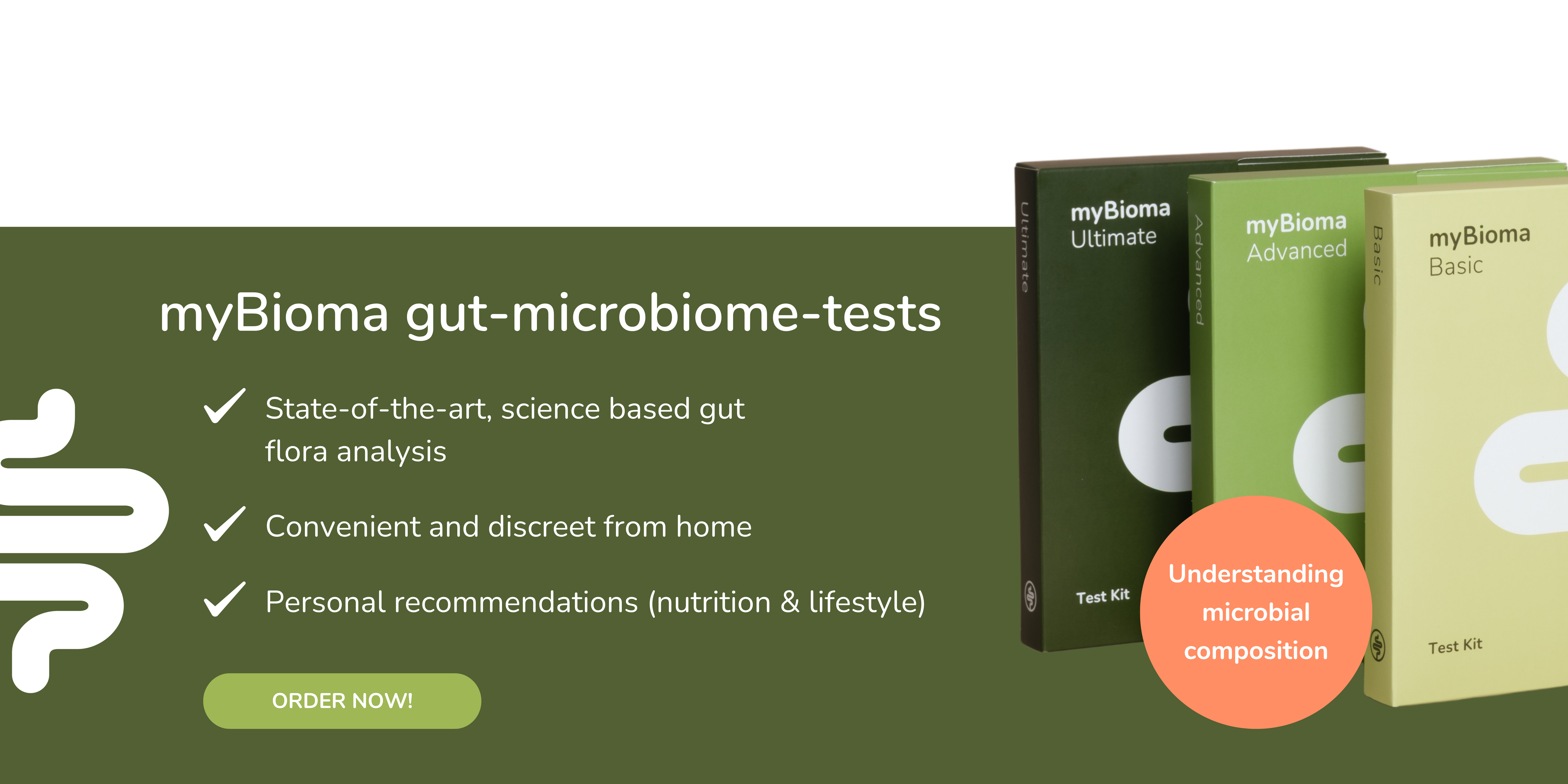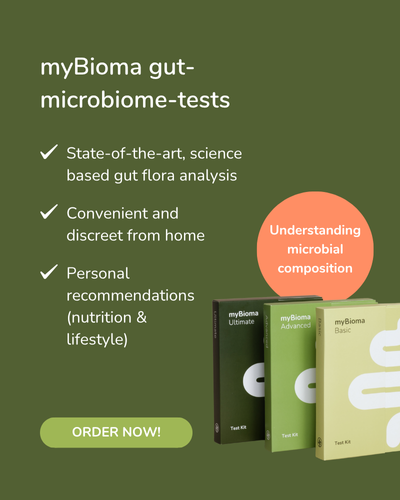Table of contents
- The gut - full of nerves!
- Does the brain control the gut?
- When the gut controls the brain
- Are our gut bacteria manipulating us?
- Serotonin as a key regulator
- The gut: The serotonin treasure trove
- Intestinal bacteria regulate serotonin
- Serotonin from food
- Does the microbiome cause mental illness?
- What can be done about it?
The gut - full of nerves!
Did you know that your gut bacteria influence your psyche? Your microbiome influences whether you are bursting with energy or whether you can't get yourself to do anything. Could it even be that the cause of depression lies not in the brain, but in the gut? Today we'll get to the bottom of these fascinating thoughts and show you the 10 most important facts about the gut-brain axis!
To find out whether gut bacteria can influence our mental state at all, let's first take a look at how the gut and brain relate to each other. Amazingly, the gut has the second largest nerve network in the body after the brain - there are 100 million nerve cells in the gut! That's pretty impressive, as we usually assume that almost all of our smart nerve cells are located in the brain. However, the intestine is actually particularly well connected - on the one hand, its nerves ensure that the complex digestive movements and the movement of food (stool) are regulated. On the other hand, the nerve cells are also entrusted with the task of collecting information from the intestine and passing it on... also to the brain. (1)
Does the brain control the gut?
It is also particularly interesting that the intestine partly controls itself. Unlike the leg muscles, for example, the intestine does not necessarily need a brain to tell it to move.The intestine is an independent organ!(1) Nevertheless, the brain can have a say - for example in stressful situations, as we all know. Before a big exam, when nervousness is at its peak, the intestines get in touch and tell the brain to do something particularly urgent. At these moments, the so-called sympathetic nervous system takes over the body. These are nerves from the brain that prepare the body for flight or fight in stressful situations. There is no room for unnecessary ballast.This allows the brain to influence bowel movements, as well as the use of fluids and messenger substances in the bowel. The gut cannot resist this either... (1, 2)

Stress has a significant impact - not only on our mental state, but also on our gut.
When the gut controls the brain
Now it gets much more exciting: Not only does the brain influence the gut, but the gut can also influence the brain in reverse.
There are various ways to do this. On the one hand, the intestinal cells produce messenger substances (hormones) that reach the brain via the blood. On the other hand, the intestine can also send messages to the brain via its nerves.Incidentally, the intestine uses the same hormones as the brain.However, it is not only intestinal cells that produce hormones, but also cells of the immune system (of which the intestine is teeming).All of these can tell the brain how the gut is doing and determine how the brain deals with it.(1, 2)
Are our gut bacteria manipulating us?
Who would have thought it - our gut bacteria not only help with digestion, they are also extremely active and make their own products. Some of these products act as messenger substances, others care for our intestinal mucosa, while others can also harm it. In any case, these products of the intestinal bacteria help determine how our intestinal cells are doing and influence what the intestine communicates about its well-being. Some of them may even have a direct effect on the brain and thus possibly on our mood. However, the key to how gut bacteria influence our mood lies in a very special hormone... (1, 2)
Serotonin as a key regulator
Serotonin is often referred to as the "happiness hormone" and is one of the most important neurotransmitters in the brain. Many nerve cells use it to communicate with each other.
Serotonin is particularly important in connection with the development of the brain at an early age and our emotions. For this very reason, it also plays a key role in mental illnesses such as depression and anxiety disorders.The exact causes of these illnesses are not fully understood, but many scientists assume that there is a lack of serotonin or at least that it is not sufficiently available in the right place. This would also explain why drugs that inhibit the breakdown or removal of serotonin work so well.(1, 2)
The gut: The serotonin treasure trove
But what does serotonin have to do with gut bacteria? We'll get to that now. The majority of our serotonin is not found in the brain.Instead, 95% of all our serotonin is in the gut! It is one of the most important messenger substances in the intestinal nerve network and determines intestinal movements, for example. Precisely because the gut is our serotonin treasure trove, it is conceivable that the actual serotonin deficiency begins in the gut and not in the brain. (1, 2)
Intestinal bacteria regulate serotonin
Depression and anxiety disorders could therefore start in the gut. As we have already heard, our microbiome influences the gut in many ways.
The same applies to serotonin production - here too, the gut bacteria intervene. For example, the bacteria produce short-chain fatty acids, which on the one hand nourish the intestinal mucosa, but on the other hand also signal to the intestinal cells whether and how much serotonin they should produce. (1, 2)
Serotonin from food
Our intestinal cells also need a certain basic building block, known as tryptophan, to be able to produce serotonin in the first place. This is an amino acid that is contained in proteins. Our body cannot produce tryptophan itself, which is why we have to take it in regularly with food.
Tryptophan can be found in eggs, yogurt, dates, cottage cheese, oats, almonds, chocolate and much more. But here too, the intestinal bacteria play a role in the absorption of tryptophan. They influence how much tryptophan from our food reaches our intestinal cells and how much we can absorb as a result. (2, 3)
Does the microbiome cause mental illness?
That is still difficult to say. Which types of bacteria intervene, where and how exactly has not yet been conclusively clarified.
However, several studies have already shown that certain bacteria are associated with mental illness. For example, some bacteria, such as Anaerostipes, Klebsiella and Streptococcus , are elevated in people with depression. Other types of bacteria, however, are absent in these people, such as Faecalibacterium and the lactic acid bacterium Bifidobacterium . (4)
What can be done about it?
As you can see, the gut-brain-microbiome axis is a complex system that still has a lot to be discovered. However, it is clear that depression and anxiety disorders are closely linked to serotonin, which is largely located in the gut, where it is influenced by gut bacteria. However, there are an incredible number of factors involved in the development of mental illness and the gut and microbiome are only part of the answer. Much more important than a healthy diet, however, is seeking help and talking honestly about it if we are not feeling well mentally. A visit to the doctor or therapist is incredibly important and is nothing to be ashamed of.
References
- Khlevner J, Park Y, Margolis KG. Brain-Gut Axis: Clinical Implications. Gastroenterol Clin North Am. 2018;47(4):727-739.
- Martin CR, Osadchiy V, Kalani A, Mayer EA. The Brain-Gut-Microbiome Axis. Cell Mol Gastroenterol Hepatol. 2018;6(2):133-148.
- Holden, Joanne. USDA National Nutrient Database for Standard Reference, Release 22. Nutrient Data Laboratory, Agricultural Research Service, United States Department of Agriculture.
- Cheung SG, Goldenthal AR, Uhlemann AC, Mann JJ, Miller JM, Sublette ME. Systematic Review of Gut Microbiota and Major Depression. Front Psychiatry. 2019;10:34.






